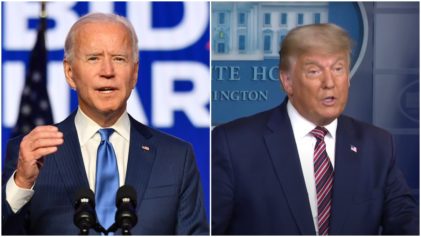With the 2020 presidential campaign underway and a crowded field of candidates, hopefuls on the Democratic side seek to distinguish themselves from the pack, while others find themselves justifying or explaining their past positions. One of those candidates is former Vice President Joe Biden, and the issue is the 1994 Violent Crime Control and Law Enforcement Act that he championed as a member of the Senate, and which President Bill Clinton signed into law.
The bill, which Biden has called the “1994 Biden Crime Bill,” as the Washington Post notes, contained measures such as a “three strikes and you’re out” component requiring a life sentence without parole for certain repeat offenders who commit a violent offense under federal law, an abolition of federal parole, and a substantial increase in mandatory minimum sentences and less judicial discretion for federal crimes, among other provisions.
The legislation also allocated $8.7 billion to states to build more prisons, with more money promised if the states ramped up penalties. In addition, the bill banned 19 types of semiautomatic assault weapons, placed 100,000 new police officers in the streets, and authorized the death penalty for a host of new crimes. According to the Brennan Center, the bill fueled the prison boom by encouraging states to construct more correctional institutions — a 43 percent increase in prisons from 1990 to 2005 — and fill the beds.
Nevertheless, at a recent speech in Nashua, New Hampshire, Biden denied the 1994 law had any impact on mass incarceration. “This idea that the crime bill generated mass incarceration, it did not generate mass incarceration,” he said, arguing that the 1994 measure covered federal crimes, while 90 percent of the convicted go to prison based on state charges.
The issue of mass incarceration and the 1994 crime bill dogged Hillary Clinton during her 2016 run for the presidency, due to the emergence of the Black Lives Matter movement and changing attitudes regarding racism in the criminal justice system, police abuse and the need to reform “tough on crime” measures and end mass incarceration.
When Bill Clinton left office, the U.S. had the world’s highest incarceration rate, with Black people accounting for the vast majority of imprisoned drug offenders, although they were no more likely than their white counterparts to use drugs. Mass incarceration has hit the black community hardest, creating a caste system and disrupting families, depriving people of their voting rights and perpetuating poverty.
On the campaign trail in 2016, Hillary Clinton faced criticism for her 1996 remarks in which she by implication referred to Black and Latino youth as “super predators.” Stumping for his wife, Bill Clinton made embarrassing remarks during his confrontation with Black Lives Matter activists — defending the crime bill and Hillary’s super predator remarks, and accusing the activists of coddling criminals. However, the previous year at the 2015 NAACP convention, Bill Clinton paved the way for his wife’s 2016 run by apologizing for his role in mass incarceration, telling the crowd, “I signed a bill that made the problem worse, and I want to admit it.”
The 1994 crime bill has a complicated history that could get lost in the current debate on policing, the justice system and the Black community. For example, there are questions as to whether the bill was responsible for a drop in crime, a trend that began even before its enactment. Studies suggest the 100,000 additional police officers on the street played a role in lower crime rates, along with socioeconomic factors such as lower alcohol use and an aging population, while imprisoning more people likely had no more than a limited impact on crime.
Further, while the crime bill faces condemnation 25 years later for the racial impact of mass incarceration on the Black community, the entire leadership of the Congressional Black Caucus and the Democratic-controlled Congress at that time supported the bill, despite present attempts to rewrite the history of its passage. Then-CBC Chair Kweisi Mfume (D-Md.) said the caucus “put our stamp on this bill” due to its anti-crime provisions and not to do Clinton a favor, while Rep. William Lacy Clay, Jr. (D-Mo.) said the CBC was primarily “concerned with the needs and concerns of the black population.”
At a time when Black America faced gang violence and the crack epidemic in their cities, many Black politicians and community activists viewed the draconian crime bill as necessary, however flawed, thereby promoting a punitive piece of legislation. Those who grow up in high-crime areas are affected by those experiences, as Michael Fortner, a professor of urban studies at the City University of New York and native of Brownsville, Brooklyn, told Slate.
“And these academic discussions, these ideological discussions about crime, completely ignore the terror in the streets. They completely ignore how crime shaped whether you went to church at night or how you felt coming home from work,” Fortner said. “Once you add that to the picture, I think crime policy becomes less suspicious. That doesn’t mean it becomes less problematic. These were dumb policies. But they begin to have a logic that is not strictly tied to racial or economic imperatives,” he added, noting that politicians responded to pleas from people in urban neighborhoods who wanted to live in safety. Black people supported these punitive anti-drug, anti-crime measures in the 1970s and 1980s, and in the 1990s Clinton sought to appeal to white working class voters who were straying from the Democratic Party with a “tough on crime” message.
While Biden refuses to take responsibility for the negative impact of the 1994 crime bill on mass incarceration, one of his rivals is taking a different stance — Sen. Bernie Sanders. Briana Blueitt, communications staffer of the Sanders campaign, told Atlanta Black Star that even before the passage of the Crime Bill, Sanders, then a member of the House, had spoken out against the mass incarceration implications of the legislation.
For example, in April 1994, Sanders said that through government neglect and “a grossly irrational set of priorities, we are dooming today tens of millions of young people to a future of bitterness, misery, hopelessness, drugs, crime, and violence.” Then-Rep. Sanders added that “all the jails in the world — and we already imprison more people per capita than any other country — and all of the executions … in the world will not make that situation right. We can either educate or electrocute. We can create meaningful jobs, rebuilding our society, or we can build more jails. Mr. Speaker, let us create a society of hope and compassion, not one of hate and vengeance.”
In other speeches on the U.S. House floor, the Sanders campaign noted, Sanders criticized the United States for having the highest per capita incarceration rate in the world and concluded the country must grapple with “the root causes of crime,” including “poverty, lack of education, lack of jobs, and lack of hope.”
Ultimately, Sanders voted for the 1994 crime bill, and announced his support because the legislation contained the Violence Against Women Act. “I have a number of serious problems with the crime bill, but one part of it that I vigorously support is the Violence Against Women Act. We urgently need the $1.8 billion in this bill to combat the epidemic of violence against women on the streets and in the homes of America,” he said in June 1994.
In August of that year, Sanders noted that six women in his state of Vermont had been murdered the year before, all by abusive spouses. “Perhaps most important to me, however, this crime bill will provide $8 million to Vermont to allow us to deal with the epidemic of violence against women,” he said, arguing the bill would “finally allow us to give women the protection that they have long been denied.”
Biden, by contrast, has sought to take credit for sponsoring the 1994 crime bill without taking responsibility for its role as a catalyst in mass incarceration, or acknowledging that the law played any role in the aggressive imprisonment of Black people in the name of the war on drugs.


